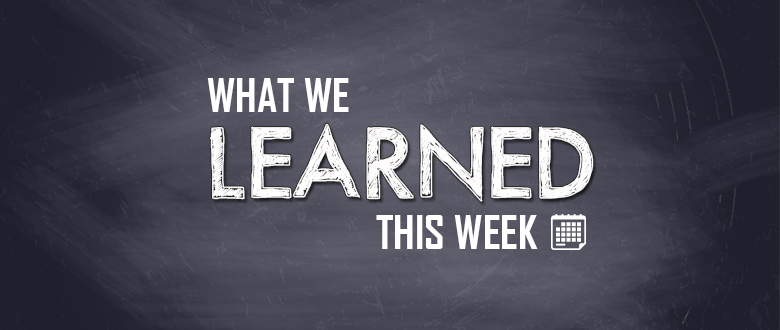LESSON #1: NOVEMBER IS THE MOST EXPENSIVE MONTH OF THE MOVIEGOING YEAR— Three consumer stars align during this month that trigger the Futurama “take my money” GIF. The first is the quality slate of films trying to peak for awards season and the holidays. October started things early and more excellent films are on the way. The second is Black Friday, where this lover of physical media adores the DVD/Blu-ray deals that stream across Best Buy, Amazon, Target, and more. Yes, Best Buy, I will dive into your $2 bin covered in double-sided tape and buy everything that sticks to me. Scope out the ads in advance as they leak. Finally, for the refined cinephiles in the room, November is the month for the half-priced Criterion sale at Barnes & Noble. Folks, it’s time to rack up that credit card debt before the actual holidays.
LESSON #2: SOME FILMS DO NOT REQUIRE A SEQUEL— Way back in 2012, I wrote an editorial on Every Movie Has a Lesson about the “most desired and long-awaited” sequels, a few of which have actually become reality in the six years since. One movie that wasn’t on the list was Ridley Scott’s Gladiator. It would have made the sub-list of “unnecessary” sequels, right there with The Shawshank Redemption and other movies that ended on perfect notes. Lo and behold, Ridley Scott and his Paramount producers can’t seem to help themselves, because details have been updated on a future story being drafted by Top Gun: Maverick and The Town screenwriter Peter Craig. I trust and enjoy Ridley’s talent work as much as the next fan, but has no serious chance of matching or topping the Oscar-winning original. It’s only going to tarnish a legacy or two. Add Bad Boys 3 to that same list.
LESSON #3: CAN PARALLEL EDITIONS OF FILMS BECOME A NEW TREND?–Notice I didn’t say “will” in that lesson. That’s assuming success that is already present. Sure, the DVD era opened the storefront door for director’s cuts, unrated editions, and more of varying rating adjustments. However, outside of something like Blade Runner (and maybe, to a milder degree, Batman V. Superman: Dawn of Justice), it’s hard to say many new post-theatrical cuts of films have go on to become definitive new standards. They feel more like novelties for the sake of selling special features. That’s what I see when I hear about the PG-13 cut coming for Deadpool 2. It can brag about being a different experience with newly created scenes to be more “parallel” than “alternate,” but how many hardcore Deadpool fans or true completists are going to pay for a tamer second take?
LESSON #4: TREAT YOURSELF TO A FOREIGN FILM— Feelin’ Film contributor Jacob Neff dropped the confessional challenge in our Facebook discussion group to ask how many of the BBC’s “100 Greatest Foreign Language Films” we have seen. We had to fess up and some of us (myself including) got an Animal House-level GPA score from our lack of exposure, experience, or completion. I recommend following Jacob’s “You Should Be Watching” column to see what titles from the list are available, especially with one month left of Filmstruck. I recommend the huge depth of foreign films available on the Kanopy service connected to your everyday local library card. In any case, don’t let Reverend Neff chastise you again. If you need a shorter list, here are Martin Scorsese’s top 39 foreign language films. Start there. Get cracking, update the prescription of your glasses for the subtitles, and indulge in some of the classic and good stuff that world cinema has to offer.
 DON SHANAHAN is a Chicago-based and Rotten Tomatoes-approved film critic writing on his website Every Movie Has a Lesson and also on Medium.com for the MovieTime Guru publication. As an educator by day, Don writes his movie reviews with life lessons in mind, from the serious to the farcical. He is a proud director and one of the founders of the Chicago Independent Film Critics Circle and a new member of the nationally-recognized Online Film Critics Society. As a contributor here on Feelin’ Film now for over a year, he’s going to expand those lessons to current movie news and trends while chipping in with guest spots and co-hosting duties, including the special “Connecting with Classics” podcast program. Find “Every Movie Has a Lesson” on Facebook, Twitter, and Medium to follow his work.
DON SHANAHAN is a Chicago-based and Rotten Tomatoes-approved film critic writing on his website Every Movie Has a Lesson and also on Medium.com for the MovieTime Guru publication. As an educator by day, Don writes his movie reviews with life lessons in mind, from the serious to the farcical. He is a proud director and one of the founders of the Chicago Independent Film Critics Circle and a new member of the nationally-recognized Online Film Critics Society. As a contributor here on Feelin’ Film now for over a year, he’s going to expand those lessons to current movie news and trends while chipping in with guest spots and co-hosting duties, including the special “Connecting with Classics” podcast program. Find “Every Movie Has a Lesson” on Facebook, Twitter, and Medium to follow his work.


 DON SHANAHAN is a Chicago-based film critic writing on his website
DON SHANAHAN is a Chicago-based film critic writing on his website